Dustin Kunnari
Congratulations to Dustin and Calah on thier engement!
Our Engagement Story (by Calah) :)
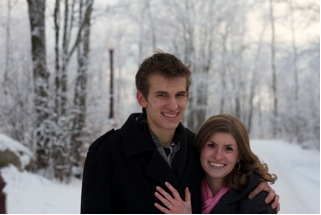 On December 17, 2012, Dustin took me to a huge Christmas light display called Bentleyville in Duluth, MN. We went with his family for what I thought was his sister's birthday celebration. For a couple of months, Dustin had been telling me how wonderful this place was and how fun it would be for several reasons: 1) there were beautiful Christmas lights to see, 2) it had an outdoor ice skating rink, and I Dustin and I both LOVE to skate, and 3) they had little fire pits along the way where you could roast marshmallows (which also happens to be one of my favorite things to do) while looking at the lights.
On December 17, 2012, Dustin took me to a huge Christmas light display called Bentleyville in Duluth, MN. We went with his family for what I thought was his sister's birthday celebration. For a couple of months, Dustin had been telling me how wonderful this place was and how fun it would be for several reasons: 1) there were beautiful Christmas lights to see, 2) it had an outdoor ice skating rink, and I Dustin and I both LOVE to skate, and 3) they had little fire pits along the way where you could roast marshmallows (which also happens to be one of my favorite things to do) while looking at the lights. 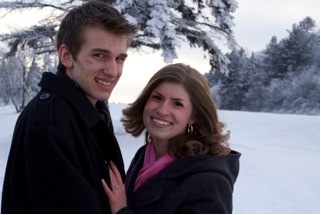 So because of all these things, I was really looking forward to going and having a nice time with Dustin and his family.
So because of all these things, I was really looking forward to going and having a nice time with Dustin and his family.
When we arrived at Bentleyville, Dustin and I decided that we would skate first and then walk around and look at the lights. So, we put on our skates and started skating. We had only gone around the ice about one time when Dustin told me that he had something for me. He pulled out a poem that he had written for me to read that he said he had been working on for a while. I thought this was very sweet of him, but asked if I could maybe read it at another time because his family was there, and I did not want to keep them waiting. However, Dustin assured me that they would wait and everything would be fine. He then stepped behind me to let me read the poem by myself. As I read through the  poem, I started to get tears in my eyes because he had taken great thought into the words that he had written and they were very sweet. As I neared the end of the poem, I could hardly see the words but I managed to get to the end of the poem where I read these words: "Calah, will you marry me?" As you might guess, I was more surprised than I had ever been in my life; and at that moment, I turned around to see Dustin on his knee with the ring in his hand. I was crying so hard that i could barely say "yes!" But I managed to say it through many tears was thrilled to be engaged to the man that the Lord had so graciously placed in my life.
poem, I started to get tears in my eyes because he had taken great thought into the words that he had written and they were very sweet. As I neared the end of the poem, I could hardly see the words but I managed to get to the end of the poem where I read these words: "Calah, will you marry me?" As you might guess, I was more surprised than I had ever been in my life; and at that moment, I turned around to see Dustin on his knee with the ring in his hand. I was crying so hard that i could barely say "yes!" But I managed to say it through many tears was thrilled to be engaged to the man that the Lord had so graciously placed in my life.
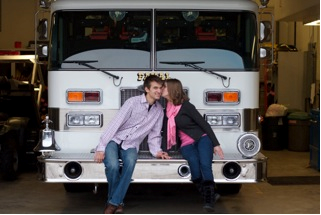
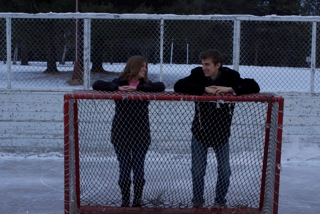
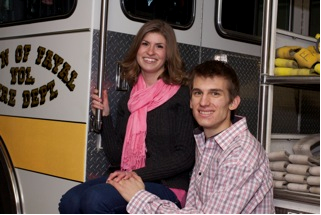
Although the road ahead may not always be easy, Dustin and I are excited to how the 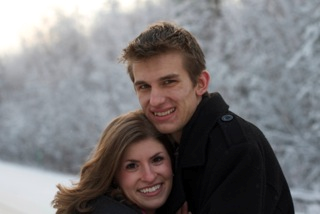 Lord is going to work in both of our lives as Dustin finishes up 2 more years of Paramedic school and as we seek to be involved in his church in MN and to be a blessing to those around us. We are praising the Lord for working in ways beyond what we could ever imagine!
Lord is going to work in both of our lives as Dustin finishes up 2 more years of Paramedic school and as we seek to be involved in his church in MN and to be a blessing to those around us. We are praising the Lord for working in ways beyond what we could ever imagine!
~ Dustin and Calah
- - - Update April 2008 - - -
We never thought Dustin would be here 14 years later! He is now 17, only has one more year of high school left, 6 feet tall and is a Certified Public Nurse! Wow! Thanks to Dr. Burzynski's treatment. Dustin is planning on continuing his Nursing education to be a registered Nurse. He is very active has no physical problems to speak of. He just had a MRI in September of 2007 and everything looks great. He took a trip recently to Big Sky, Montana to go snowboarding which he loves to do. He also plays the guitar.
- - - Update August 2004 - - -
Dustin is now 13 years old Cancer free and doing great. He no longer needs any medicine except vitamins. He loves to swim, bike, and play baseball with his brother.
- - - Update July 2003 - - -
Dustin was able to take capsules to end his treatment for 2 years. He is now 12 years old . He has been in remission since September 1995, for 7 years. He is playing baseball, basketball, and he is doing very well on his guitar. Nobody would ever know when meeting Dustin that he ever had brain cancer. Thanks to the Burzynski's treatment our son is healthy and normal. Dustin is pretty set in his mind that someday he wants to be a fireman in New York . So he can help our many people. Please feel free to call, write or e-mail us. This email address is being protected from spambots. You need JavaScript enabled to view it. Dustin is now 8 years old. In July 1999, Dustin was able to stop taking antineoplaston capsules.
4107 Bodas Road
Eveleth, MN 55734
Dustin's parents, Marianne and Jack, welcome your phone calls: 218-744-5853.
Updated 1997
Dustin is an active, intelligent 6 year old. One year ago, he was hampered only by a Hickman catheter implanted in his upper abdomen, with IV tubing attached for periodic infusions throughout the day. When asked, his parents need to point him out among his siblings as "the one with cancer." This scenario is far different from what was presented to Dustin's parents 2 years ago. It is the result of much effort, sacrifice, and learning in the face of pressure to get traditional treatment, skepticism of alternative treatments, threats, and ridicule. These are the events as they unfolded in the life of Dustin.
Christmas and the beginning of 1994 were times of vomiting, crying with bad headaches, and then walking difficulties for 2-1/2-year-old Dusty. One February morning, his father Jack stepped out the door to once again bring Dusty to the doctor. His mother Mariann stayed behind with his siblings: Elana, aged 5, Sarah, 4, and Dereck, 8 months. Little did the family know that this day was the beginning of a change in the course of their lives.
They had some warning that something was wrong. Mariann had recently read an article on brain tumors, and Jack could tell from the expression in the nurse's eyes as the MRI was read that things were serious. Nevertheless, the diagnosis of a brain tumor came as a shocking reality. Still, there was hope that it was benign.
On February 28th, Jack and Mariann sat with family and friends in a lounge outside the operating room waiting to see Dustin, waiting for the surgeon to give his report. Dustin had medulloblastoma, a highly aggressive form of cancer. The doctor had removed 75% of the tumor but was unable to get the rest in the folds and crevices of the brain without doing damage. Dusty would have to go to a larger hospital for further treatment.
In the week that followed, Dustin regained enough strength in his incised neck muscles to turn his head and hold it without support. He started walking again. Doctors and nurses were impressed with the progress in his motor skills. However, as Dustin and his parents left for the next hospital, the sober expression on the nurses' faces showed their experience with patients having this diagnosis. The prognosis was not good.
In the days that followed, Jack and Mariann observed other children being treated for cancer and learned what the doctors as this hospital had to offer Dusty. Radiation would certainly cause mental retardation and was not recommended at his age but would be done if chemotherapy failed. They were given information on chemotherapy. Dusty could be part of a study, with a computer picking the drug he would be placed on. Among the risks involved were hearing loss, stunted growth, learning disabilities, bladder and kidney damage, sterility, and leukemia. There was a 20% to 40% chance the treatment would work.
Jack questioned the doctor as to how many patients had been helped by this treatment and if there was anyone they could talk to who had been through it. The doctor said he didn't know and he'd have to check the records. This raised questions in the minds of Jack and Mariann. Shouldn't a doctor know if the procedure he was using had good results?
Jack and Mariann also were given the case histories of seven patients studied by the National Cancer Institute. These patients had been treated with a nontoxic therapy called antineoplastons discovered by Dr. Stanislaw Burzynski. Although all seven showed a reduction in tumor size, Jack and Mariann were encouraged to continue with the oncologist at this hospital because antineoplaston therapy was not yet FDA-approved. When the Kunnari's hesitated to sign the consent form, the success rate of the chemotherapy offered by this hospital was increased from a possible 40% to 80%.
Jack and Mariann left for home with an unsigned consent form amid threats that court action to remove Dustin from their home would be taken if they did not consent to treatment. Mariann's brother, a doctor, told them the threat was not an empty one. He feared that their other children could be taken as well.
As the weeks passed, Jack and Mariann learned all they could about other treatments. They were surprised at how many alternative treatments there were, and how many cancer patients had been helped by them. The treatment they decided to try was the nontoxic antineoplastons being studied by researcher Dr. Stanislaw Burzynski. He had been having good results with brain tumors and other forms of cancer using substances that occur naturally in the human body. His credentials, laboratory studies, and case histories were impressive.
April of 1994 found Dustin and his family in Houston, Texas, visiting the Burzynski Clinic. Dusty was too young to be part of Dr. Burzynski's study. However, in response to the pleas of Jack and Mariann, and out of compassion, Dr. Burzynski agreed to treat Dusty. They were all confident that this treatment had a good chance of helping him.
Dustin was equipped with an IV pump that he carries around in a back pack while he receives the antineoplastons intravenously. Jack and Mariann were taught how to program the pump for specific treatment times and dosages. They learned sterile technique in the care of the IV tubing and have learned how to deal with emergencies. (Being a rough and tumble boy, Dusty's IV line has burst twice, needing repair.)
When Dustin started antineoplastons, Dr. Burzynski told the Kunnari's he would stop the treatment if there were no positive results on the first MRI, which would be taken after 6 weeks of treatment. To their great joy, the 6-week MRI showed no evidence of tumor. Every 3 months, the Kunnari's make a trip to Houston for Dusty's checkup and to get more medication. After 1 year on antineoplaston therapy, a tumor once again was seen on a follow-up MRI, showing the aggressiveness of medulloblastomas. Dusty's dosage was increased, and he continues to have periodic lab tests and MRIs done.
Dusty has few side effects; no hair loss, nausea, or weakness. He has had occasional bouts of diarrhea as the tumors have broken up, and has had lowered white blood cell counts. Dusty's parents have found that when he drinks Essiac tea (Herbal Essence) regularly, his white count increases.
As Dusty visits the hospital where he had surgery and the Burzynski Clinic, he is quick to greet old friends. Medical personnel continue to be amazed with his robust health, energy, and outgoing personality. He has been an inspiration to many who have come to know him.
Ellen Nygaard (Dustin's Aunt)
Letter from Anthony F. Novak, MD
Interstate Medical Center, Affiliated with the University of Minnesota Health System
January 5, 1996
RE: Stanislaw Burzynski, MD
To Whom It May Concern:
I am a physician practicing medicine in southern Minnesota. Dustin Kunnari is my nephew and has been under the care of Stanislaw Burzynski, MD, since April of 1994. Dustin was diagnosed with a medulloblastoma at the age of 3 years. This is a very rare and aggressive tumor, with an extremely poor prognosis. In February of 1994, he underwent surgical removal of the tumor. Some tumor remained, however, and treatment with radiation and/or chemotherapy was advised. This carried with it a significant morbidity and/or mortality. Following surgery, Dustin had no evident neurologic deficits.
Against my advice, my sister Marianne Kunnari and her husband Jack elected to pursue treatment with Dr. Burzynski. Dustin was initiated on therapy in April of 1994. Several months later, a repeat magnetic resonance scan showed no evident tumor remaining. Both Dustin's neurosurgeon and primary care doctor were amazed by the results of the MRI scan. Dustin continued to do extremely well, suffering no evident recurrence or neurological deficits. He is basically a "normal" 3-and-a-half-year-old. In April of 1995, however, there was recurrence of the tumor. Dr. Burzynski increased the dose of medication; and the tumor subsequently, over the next several months, regressed, again with minimal to no side effects.
As I understand, Dr. Burzynski has come under investigation for his work with tumors in humans. I also understand that Dustin's future treatment will be determined by the court. I am requesting that Dr. Burzynski be allowed to continue to treat Dustin in a compassionate manner. Dustin has, as far as can be determined, significantly benefited from this treatment and has remained a "normal" child under Dr. Burzynski's treatment. If this treatment is discontinued, the only alternative would be standard therapies, ie, chemotherapy and radiation, both of which carry significant morbidity and mortality. The physicians evaluating Dustin stated that he would certainly experience considerable brain damage and may end up incapacitated for a lifetime under these forms of treatments.
In summary, to allow this treatment to continue may perhaps offer this vivacious 4-year-old a normal lifetime and victory over the insurmountable enemy: brain cancer. This is offered as opposed to a possible "cure of the tumor" but incapacitation of the child, resulting in a lifetime of institutional care. This would be an unforgivable and extremely unreasonable fate in this era of medical "advancement." I am begging the court to give Dustin this chance.
Thank you for your consideration.
Sincerely,
Anthony F. Novak, MD

